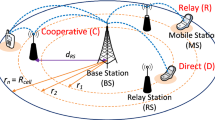Abstract
Throughput and fairness are conflicting objectives in many networking scenarios. To address this issue, relays have been considered/used to improve the overall throughput without sacrificing fairness. However, we observe that in a relay-based wireless network, throughput-based fairness significantly limits the performance of the relay users when they are energy limited. To overcome this issue, we propose the notion of max–min energy efficiency throughput fairness, by which relay users with a higher energy consumption can reap a higher throughput. We further propose an efficient data rate allocation algorithm to achieve the fairness objective in a multi-hop relay wireless network. Simulation results show the advantages of the proposed fairness policy compared to other fairness objectives.







Similar content being viewed by others
References
Tan, G., & Guttag, J. (2004). Time-based fairness improves performance in multi-rate wireless lans. In USENIX annual technical conference.
Lee, S., Banerjee, S., & Bhattacharjee, B. (2004). The case for a multi-hop wireless local area network. In IEEE Infocom.
Dong, Q., Banerjee, S., & Liu, B. (2006). Throughput optimization and fair bandwidth allocation in multi-hop wireless LANs. In IEEE infocom.
Andreev, S. D., et al. (2011). Analysis of client relay network with opportunistic cooperation. In IFIP WWIC.
Yang, Y., Hu, H., Xu, J., Mao, G. Relay technologies for WiMAX and LTE-advanced mobile systems. IEEE Communications Magazine, 47(10), 100–105.
Deb, S., Mhatre, V., & Ramaiyan V. (2008). WiMAX relay networks: Opportunistic scheduling to exploit multiuser diversity and frequency selectivity. In ACM Mobicom.
Sundaresan, K., Rangarajan, S. (2008). On exploiting diversity and spatial reuse in relay-enabled wireless networks. In ACM Mobihoc.
Bejerano, Y., Han, S.-J., & Li, L. E. (2004). Fairness and load balancing in wireless lans using association control. In ACM MobiCom.
Tassiulas, L., & Sarkar, S. (2002). Max-min fair scheduling in wireless networks. In IEEE Infocom.
Kasten, O. Energy consumption. http://www.inf.ethz.ch/personal/kasten/research/bathtub/energy_consumption.html.
Huang, X. L., & Bensaou, B. (2001). On max-min fairness and scheduling in wireless ad-hoc networks analytical framework and implementation. In ACM MobiHoc.
Subramanian, V. G., Duffy, K. R., & Leith, D. J. (2009). Existence and uniqueness of fair rate allocations in lossy wireless networks. In IEEE Transactions on Wireless Communications, 8(7), 3401–3406.
Hou, Y., Shi, Y., & Sherali, H. (2004). Rate allocation in wireless sensor networks with network lifetime requirement. In ACM MobiHoc, 67–77.
Tang, J., Xue, G., & Zhang W. (2006). Maximum throughput and fair bandwidth allocation in multi-channel wireless mesh net works. In IEEE Infocom.
Heusse, M., Rousseau, F., Berger-Sabbatel, G., & Duda, A. (2003). Performance anomaly of 802.11b. In IEEE Infocom.
Nandagopal, T., Kim, T.-E., Guo, X., & Bharghavan, V. (2000). Achieving MAA layer fairness in wireless packet networks. In ACM MobiCom.
Lu, S., Luo, H., & Bharghavan, V. (2000). A new model for packet scheduling in multihop wireless networks. In ACM MobiCom, 76–86.
Penttinen, A., Koutsopoulos, I., & Tassiulas, L. (2005). Low-complexity distributed fair scheduling for wireless multi-hop networks. In IEEE Wiopt.
Wang, X., & Kar, K. (2005). Throughput modelling and fairness issues in CSMA/CA based ad-hoc networks. In IEEE Infocom.
Gambiroza, V., Sadeghi, B., Knightly, E.W. (2004) End-to-end performance and fairness in multihop wireless backhaul networks. In Proceedings of the 10th annual international conference on mobile computing and networking (MobiCom’04) (287–301).
Cicconetti, C., Akyildiz, I. F., & Lenzini, L. (2009). FEBA: A bandwidth allocation algorithm for service differentiation in IEEE 802.16 mesh networks. In IEEE Transactions in Networking, 17(3), 884–897.
Luo, L., Raychaudhuri, D., Liu, H., Wu, M., & Li, D. (2008). Joint association. Routing and bandwidth allocation for wireless mesh networks. In IEEE Globecom.
Tang, J., & Zhang, X. (2007). Cross-layer resource allocation over wireless relay networks for quality of service provisioning. In IEEE Journal on Selected Areas in Communications, 25(4), 645–656.
Sundaresan, K., & Rangarajan, S. (2009). Efficient algorithms for leveraging spatial reuse in OFDMA relay networks. In IEEE Infocom.
Gkatzikis, L., & Koutsopoulos, I. (2010). Low complexity algorithms for relay selection and power control in interference-limited environments. In IEEE Wiopt.
Hua, Y., Zhang, Q., & Niu, Z. (2010). Resource allocation in multi-cell OFDMA-based relay networks. In IEEE Infocom.
Maekawa, T., Hara, T., & Nishio, S. (2006). A collaborative web browsing system for multiple mobile users. In IEEE PerCom.
Iosifidis, G., Gao, L., Huang, J., & Tassiulas, L. (2014). Incentive mechanisms for user-provided networks. In IEEE Communications Magazine, 52(9), 20–27.
Xu, D., & Liu, X. (2007). Energy efficient throughput optimization in multi-hop wireless networks. In IFIP networking.
Acknowledgments
The work was partially supported by UC Davis Chancellor’s fellowship, and NSF Grants 1423542 and 1147930. Part of the work was presented at IFIP Networking 2007 conference [29]. The authors thank the editor and all the reviewers for their insightful comments and suggestions, which significantly improved the quality of the paper.
Author information
Authors and Affiliations
Corresponding author
Rights and permissions
About this article
Cite this article
Xu, D., Liu, X. Throughput-fairness optimization in energy-limited user-relay wireless networks. Wireless Netw 21, 1047–1060 (2015). https://doi.org/10.1007/s11276-014-0829-4
Published:
Issue Date:
DOI: https://doi.org/10.1007/s11276-014-0829-4




